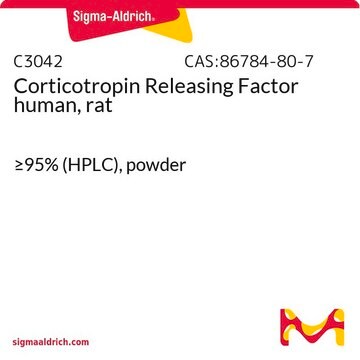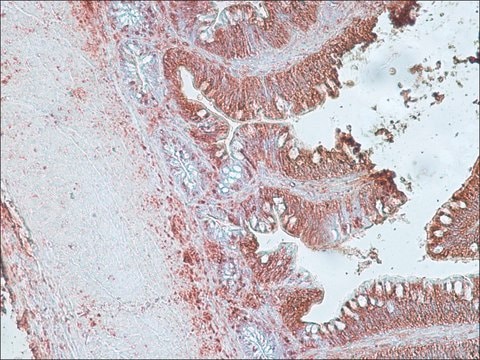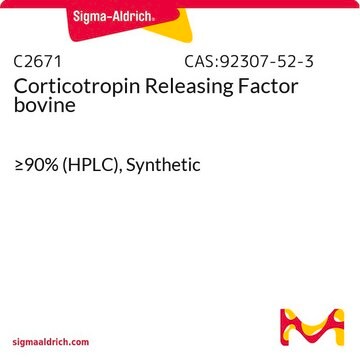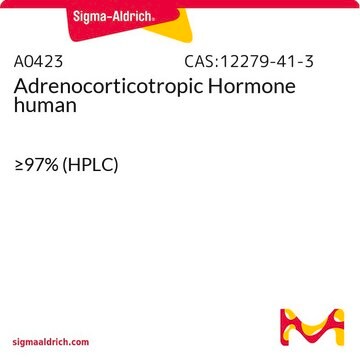05-23-0050
Corticotropin Releasing Factor, Human and Rat
An immunomodulatory neuropeptide that acts to release ACTH from the anterior pituitary and stimulates the sympathetic nervous system and adrenal medulla.
Synonyme(s) :
Corticotropin Releasing Factor, Human and Rat, CRF, CRH, Corticotropin-releasing hormone
About This Item
Produits recommandés
Niveau de qualité
Pureté
≥97% (HPLC)
Forme
lyophilized solid
Fabricant/nom de marque
Calbiochem®
Conditions de stockage
OK to freeze
desiccated (hygroscopic)
Technique(s)
cell based assay: suitable
Couleur
white to off-white
Solubilité
5% NH4OH: 1 mg/mL (prepared with H₂O)
Conditions d'expédition
ambient
Température de stockage
−20°C
Clé InChI
VXFVFWFSJFSXHN-FAUHKOHMSA-N
Informations sur le gène
human ... CRH(1392)
Description générale
Corticotropin-releasing factor (CRF), a 41-amino-acid peptide, is widely expressed in neurons throughout the mammalian brain and several peripheral tissues such as the pancreas, stomach, and small intestine. It functions by stimulating the secretion of corticotropin in the anterior pituitary, which in turn regulates adrenal cortex synthetic/secretory activity. Human CRF is located on chromosome 8q13 and is identical to rat and mouse CRF. It assumes a random coil structure under physiological conditions and α-helix shape in an amphiphilic environment.
Application
Actions biochimiques/physiologiques
Primary Target: An immunomodulatory neuropeptide
The product does not compete with ATP.
Reversible: no
Corticotropin-releasing factor (CRF), a neuropeptide also known as corticotropin-releasing factor (CRH), plays a crucial role in the stress response by activating the hypothalamic-pituitary-adrenal (HPA) axis and extrahypothalamic pathways. It acts by releasing Adrenocorticotropic Hormone (ACTH) from the anterior pituitary, stimulating the sympathetic nervous system and adrenal medulla. Besides its involvement in stress regulation, CRF peptides have diverse effects on both, the central nervous system and peripheral tissues. This includes potential regulation of anxiety, mood, feeding, inflammation, gastric emptying, and blood pressure. Aberrant secretion of CRF could potentially contribute to the development of various neuropsychiatric disorders such as anxiety, depression, obsessive-compulsive disorder, Parkinson′s disease, Alzheimer′s disease, alcohol withdrawal, and post traumatic stress disorder. Also, CRF and CRF-R1 (Corticotropin-Releasing Factor Receptor 1) have been observed in lymphoid organs and sites of inflammation, suggesting a role in immune system regulation.
Conditionnement
Avertissement
Séquence
Forme physique
Reconstitution
Autres remarques
Wei, E.T., et al. 1993. Ciba Found. Symp. 172, 258.
Smith, E.M., et al. 1986. Nature321, 881.
Udelsman, R., et al. 1986. Nature319, 147.
Informations légales
Code de la classe de stockage
11 - Combustible Solids
Classe de danger pour l'eau (WGK)
WGK 3
Point d'éclair (°F)
Not applicable
Point d'éclair (°C)
Not applicable
Certificats d'analyse (COA)
Recherchez un Certificats d'analyse (COA) en saisissant le numéro de lot du produit. Les numéros de lot figurent sur l'étiquette du produit après les mots "Lot" ou "Batch".
Déjà en possession de ce produit ?
Retrouvez la documentation relative aux produits que vous avez récemment achetés dans la Bibliothèque de documents.
Notre équipe de scientifiques dispose d'une expérience dans tous les secteurs de la recherche, notamment en sciences de la vie, science des matériaux, synthèse chimique, chromatographie, analyse et dans de nombreux autres domaines..
Contacter notre Service technique








